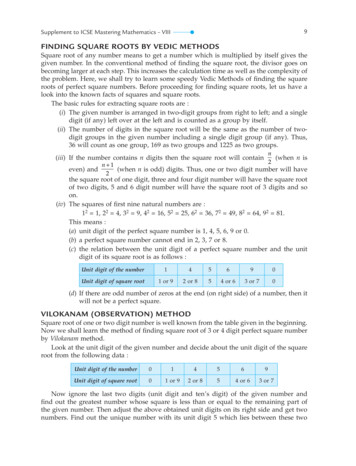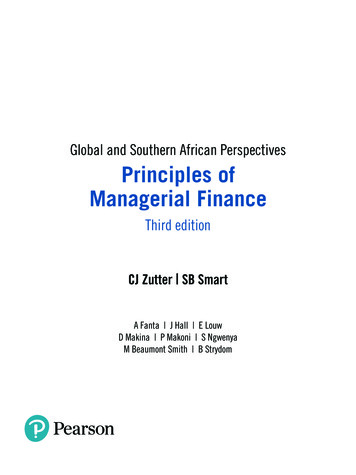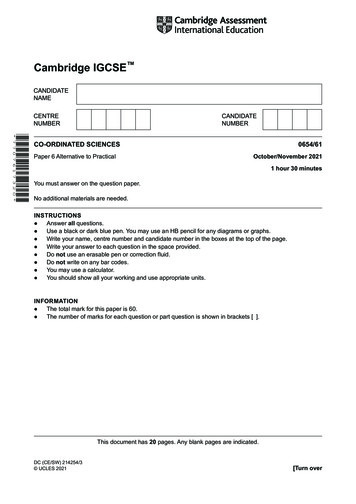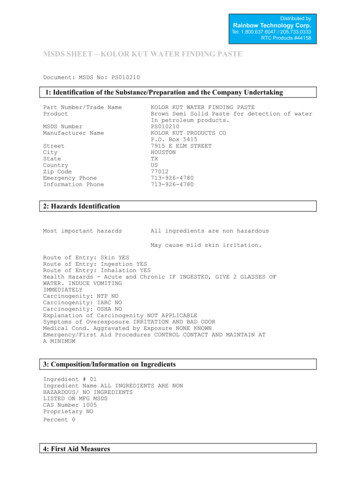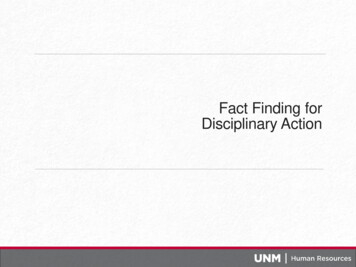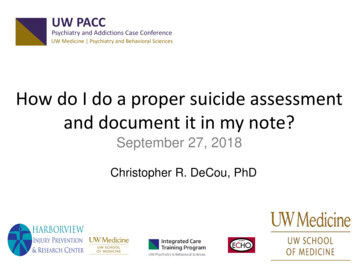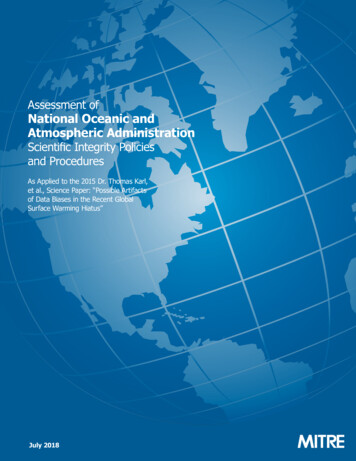
Transcription
A Solution-finding ReportTitle: Secondary School Counselor Performance and Accountability ModelsDate: 2/2/10IntroductionThis report responds to a request by Frank DeRosa—the Great Lakes East Comprehensive Centerstate manager for the Indiana Department of Education—for “assistance in developing and implementinga plan to increase accountability and performance of secondary school counselors.”This Solution-finding Report is intended to provide a quick response to the request forinformation. Its contents are divided into two sections. The first section deals with the key components ofan exemplary secondary school counselor performance and accountability model. The second section iscomprised of references to and brief summaries of the websites of state education agencies withexemplary models, and state publications related to school counseling programs and/or their development.ContentsI.II.Components of an Exemplary Secondary School Counselor Performance andAccountability ModelWebsites/Publications of State Education School Counseling Program ModelsI. Components of an Exemplary Secondary School Counselor Performance and AccountabilityModelAccording to the American School Counselor Association (ASCA), high school is a time forstudents to transition into adulthood and the world of work, begin separating from their parents, andexploring and defining their independence. They face increased pressures regarding risk behaviorsinvolving sex, alcohol, and drugs, while exploring the boundaries of more acceptable behavior andmature, meaningful relationships. They need guidance in making concrete and compounded decisions.They must deal with academic pressures as they face high-stakes testing, the challenges of collegeadmissions, the scholarship and financial aid application process, and entrance into a competitive jobmarket.The ASCA describes school counselors as professional educators with a mental healthperspective who understand and respond to the challenges presented by today’s diverse studentpopulation. Rather than working in isolation, they are integral to the total educational program. Theywork with the school’s overall mission of supporting the academic achievement of all students, and they
accomplish this through the design, development, implementation, and evaluation of a comprehensive,developmental, and systematic school-counseling program.There was a time when school counselors were accepted on faith alone, but now, with dwindlingbudgets, perhaps more than ever school counselors are being asked to be accountable (Myrick, 2003).This involves describing goals, describing what is being done to meet those goals, collecting data thatsupport any claimed accomplishments, and perhaps collecting documentation that demonstratescompliance with state laws or school board directives.In 2003, the ASCA launched a framework for school counseling programs, the ASCA NationalModel for School Counseling Programs (ASCA, 2003). The model states that a school counselingprogram must have a solid foundation, upon which the rest of the program is built. This foundation—which determines how every student will benefit from a school counseling program—should includebeliefs and philosophy, mission, domains, and ASCA National Standards/competencies. Beliefs andPhilosophy are a set of principles that all personnel involved in managing and implementing the programmust agree on, and that guide the program’s development, implementation, and evaluation. Mission is amission statement that describes the program’s purpose and a vision of what is desired for every student,and is a subset of the school’s, district’s, and state’s missions. Domains are the three broad domains inwhich the school counseling program facilitates student development—academic, career, andpersonal/social—to promote and enhance the learning process. And ASCA NationalStandards/Competencies are student competencies that define the knowledge, attitudes, or skills studentsshould obtain or demonstrate as a result of their involvement in a school counseling program.These student competencies are developed and organized into two intertwined content area: thedelivery system and the management system.The delivery system—the “how” of the school counseling program—has four components. TheGuidance Curriculum component consists of structured developmental lessons designed to help studentsachieve the knowledge, attitudes, and skills appropriate for their developmental level; it is presentedsystematically through classroom and group activities K through 12. The Individual Planning withStudents component consists of school counselors coordinating ongoing systemic activities designed toassist the individual student in establishing personal goals and developing future plans. The ResponsiveServices component consists of activities to meet students’ immediate needs that require counseling,consultation, referral, peer mediation or information. And the Systems Support component consists of theadministration and management activities that establish, maintain, and enhance the total guidanceprogram.The management system—the “when, why, by whom and on what authority” of the schoolcounseling program—must be organized, concrete, clearly delineated, and reflective of the school site’sneeds, and has six components. Management Agreements are school counselor–administrator agreementsthat include statements of responsibilities by each school counselor, specifying the results the schoolcounselor is accountable for achieving during the year; the agreements also spell out how the schoolcounselors divide program responsibilities, and they are negotiated with and approved by designatedadministrators at the beginning of each school year. The Use of Data component is included because acomprehensive school counseling program is data driven; the use of data to effect change within theschool system is integral to ensuring that every student receives the benefits of the school counselingprogram, and counselors must show that each activity implemented as part of the program was developedfrom a careful analysis of students’ needs, achievement, and/or related data. Monitoring Students’Progress ensures all students receive what they need to achieve success in school by monitoring student
achievement data, achievement-related data, and standards- and competency-related data; collection,analysis, and interpretation of student achievement data may be systemic by district, or specific to schoolsite, grade, class, or individual. The Closing the Gap component is data-driven, since data are necessaryto determine where a student is, where he or she should be, and where he or she is going; the needssurface when disaggregated data are analyzed for every student, needs being the identified discrepanciesbetween the desired results and the results currently being achieved. Action Plans must be developed forevery competency and result desired, with guidance curriculum action plans including: (1) the domain,standard, and competency addressed; (2) a description of actual activity; (3) the curriculum or materials tobe used; (4) when the activity is to be completed; (5) the person(s) responsible for the delivery; (6) themeans of evaluating student success (i.e., process or outcome data); and (7) the expected result forstudent(s)—Closing the gap action plans also describing the data driving the decisions addressed in thiscompetency. The Use of Time/Calendars component involves counselors determining the amount of timeto spend in each area of the delivery system, then developing and publishing master and weekly calendarsto ensure students, parents, teachers, and administrators know what is scheduled, which helps in planningand ensures active program participation.ASCA stresses that “Accountability and evaluation of the school counseling program are absolutenecessities” (Hatch & Bowers, 2004, p. 19). Especially now, school counselors are challenged todemonstrate the effectiveness of their programs, and need to collect data that supports and links theschool counseling program to students’ academic success. ASCA mentions four components of theaccountability system. Results Reports, which include process, perception, and results data, ensureprograms are carried out, analyzed for effectiveness, and changed and improved as required; counselorsshould collect and analyze immediate, intermediate, and long-range results, and sharing these reports withstakeholders serves as an advocacy for both the students and the program. The School CounselorPerformance Evaluation contains basic standards of practice expected of school counselors implementinga school counseling program, and these performance standards serve as a basis for counselor evaluationand counselor self-evaluation (see Appendix A and B: ASCA School Counselor Performance Appraisal,and ASCA School Counselor Competencies). The Program Audit/Evaluation provides evidence of theprogram’s alignment with ASCA’s National Model for School Counseling Programs, and the primarypurpose for data collecting is to guide future actions within the program, designed to improve futureresults for students. An Advisory Council is a group—made up of students, parents, teachers, schoolcounselors, administrators, and community members—appointed to review guidance program results andto make recommendations.
II. Websites/Publications of State Education School Counseling Program ModelsWashington School Counselor Associationhttp://www.wa-schoolcounselor.org/The website promotes best practices in, and advocates for, professional school counseling. TheWashington School Counselor Association (WSCA): serves over 850 WSCA members; supportsschool counselors’ efforts to promote academic, career, and personal/social development in allstudents; provides professional development; and advocates for school counselors withlegislators, parents, school boards, and other educational professionals.New York State School Counselor Associationhttp://www.nyssca.org/The New York State School Counselor Association (NYSSCA) is the chartered state chapter ofthe American School Counselor Association (ASCA). The Mission of the New York State SchoolCounselor Association is to promote excellence in the profession of school counseling in order toenhance the development of all students. It is the primary advocate for School Counselorsthroughout New York. Its website contains a plethora of information, including a ProfessionalDevelopment page.Connecticut School Counselor Associationhttp://www.ctschoolcounselor.org/The Connecticut School Counselor Association (CSCA) promotes excellence in professionalschool counseling by advocating for the role and programs of school counselors and bydemonstrating leadership in developing new and supportive services and programs for itsmembers. The role of the professional school counselor is to foster student growth in academic,personal/social, and career development so they achieve successes in school and are prepared tolead fulfilling lives as responsible members of society. The CSCA website contains sections forcounselors, administrators, and parents, as well as numerous resources, including sections on BestPractices and Accountability (see Appendix C and D: MEASURE—a six-step accountabilityprocess which helps school counselors demonstrate how their programs impact critical data—andMEASURE Template).
Connecticut: A Guide to Comprehensive School Counseling Program EPS/Special/counseling.pdfConnecticut’s public schools are responsible for providing high-quality learning opportunities forall students and to assist them in becoming capable and confident learners. The comprehensiveschool counseling program aligns with the school district and state education mission, andenhances learning by assisting students to acquire critical skills in the academic, career, andpersonal/social aspects of student development. School counselors use a variety of prevention andintervention models and programs to assist students in overcoming barriers to learning, to makestrong connections with educational opportunities in their schools, and to ensure that every childlearns in a safe, healthy, and supportive environment. The program is proactive and preventativein its focus and aligns with the educational mission of districts and with school improvementplans. School counselors are in a strategic position to support school improvement initiatives andto be leaders in advocating for better outcomes for all students.Florida: Administrator’s Guide to Florida’s School Counseling and Guidance Framework:A Comprehensive Student Development Program odel.pdfFlorida’s School Counseling and Guidance Framework was developed to assist local districts indeveloping or revising their district plans for counseling and guidance. It can be used as aresource in the planning, development, implementation, and evaluation of a school counselingand guidance program that supports the personal, social, educational, and career development ofall students.Idaho: The Idaho Comprehensive School Counseling Program fThe Idaho Comprehensive School Counseling Program Model helps counselors, administrators,and teachers develop, implement, and evaluate individualized school counseling programs fortheir own schools and districts.Iowa: Iowa Comprehensive Counseling and Guidance Program Development The purpose of the Iowa Comprehensive Counseling and Guidance Program Development Guideis to provide counselors, student service personnel, and administrators of Iowa’s schools with apractical resource for designing and/or improving locally established comprehensive counselingand guidance programs.
Louisiana: Model for Comprehensive Guidance and 877.pdfWhile Louisiana will continue to provide professional development programs to assist district andlocal educators in improvement of guidance efforts, this document is a resource for their dailyuse. Its purpose is to guide schools and school districts to plan, implement, and evaluatecomprehensive guidance and counseling programs.Massachusetts: Massachusetts Model for Comprehensive School Counseling chusetts.pdfThe Massachusetts Model for Comprehensive School Counseling Programs was designed toserve as a catalyst for change by outlining how school counseling programs can support studentachievement and education reform objectives.Maine: Maine Comprehensive School Counseling Program fThe authority for creating a Maine Comprehensive School Counseling Program Model comesfrom Chapter 125: Basic Approval Standards: Public Schools and School Administrative Units.This rule states that “Each school administrative unit shall have a Comprehensive GuidanceProgram, including guidance and counseling services, available to all students in grades K-12.This program shall be a component of the Comprehensive Education Plan which is to beimplemented by the end of the 2006–2007 school year.” The school counseling programfacilitates student development in three broad domains—academic, career, and personal/social—to promote and enhance the learning process.Montana: Montana School Counseling Programhttp://www.mtschoolcounselor.org/MT School Counseling Program Model/files/MT SchoolCounseling Program.pdfIn 2004, the Montana School Counseling Association’s Executive Board voted to design a schoolcounseling program model that is founded upon the fundamentals described by American SchoolCounselor Association (ASCA) in their publication, the National School Counseling ProgramsModel. This publication says it is important to note that this model is intended to act as aframework or template for school counselors to use in designing a school counseling program fortheir respective schools, and is not intended to be a mandated or required program.
Nebraska School htmThis website has links to the Nebraska Model for School Counseling Programs, StudentStandards, Professional Counselor Standards, Nebraska Policy, the ASCA National Model, theASCA Position Statements, the American School Counselor Association, the Nebraska SchoolCounselor Association, National Research, Nebraska Research, and Publications.New Hampshire: New Hampshire Implementation Manual for Comprehensive School Guidance New%20Hampshire.pdfThis manual presents a method to develop, implement, and evaluate comprehensive guidance andcounseling programs in New Hampshire’s schools. It is organized around the standards of the NHK-12 Career Development Curriculum Framework, available from the NH Department ofEducation, as well as the National Standards for School Counseling Programs (1997) by theAmerican School Counselor Association.New Jersey: The New Jersey School Counseling Initiative: A Framework for Developing YourComprehensive School Counseling l.pdfThis framework was designed to provide the tools necessary to help school districts andcounselors examine current school counseling practices and services and then work to align themwith the ASCA National Standards and National Model, and New Jersey Core ContentCurriculum Standards. It will also designed to help them address the mandates of No Child LeftBehind; Harassment, Intimidation, and Bullying Legislation; and New Jersey AdministrativeCode. The framework was meant to help counselors clarify their roles, eliminating clerical andnon-guidance tasks, and design and promote the management and delivery of a school counselingprogram comprehensive in scope, preventative in design, and developmental in nature.New Mexico: New Mexico Comprehensive School Counseling Program Guidehttp://www.nmsca.org/cpg.htmIn addition to Introduction, Counselor Skills, and Implementation, this website has four sections:Foundation (including Beliefs and Benefits, Mission Statement, Local/State/National Standards,and New Mexico Policy), Management System (including Counselor/Administrator Agreements,Advisory Council, Use of Data, Action Plans, and Use of Time), Delivery System (includingIndividual Student Planning, Curriculum, Responsive Services, and System Support), andAccountability (including Results Report, Counselor Performance Evaluation, Program Audit).
New York: The New York State Model For Comprehensive K-12 School Counseling 0York.pdfThis 132-page booklet is the result of input from countless school counselors and counseloreducators from around New York State. It provides knowledge and tools to help school districtadministrators and school counselors examine current school counseling practices and servicesand align them with the ASCA National Standards, the ASCA National Model, and theexpectations of the New York State Education Department. The New York State Model supportsthe overall mission of the school by promoting student achievement, career planning, andpersonal social development for every student. School counselors—using their leadership,advocacy, teaming and collaboration, and data-driven decision-making skills—will ensure thatevery student will have access to a quality and equitable education. The New York State Modelconsists of four interrelated components: the foundation, the delivery system, the managementsystem and accountability.Oregon: Oregon’s Comprehensive Guidance and Counseling on.pdfOregon’s Comprehensive Guidance and Counseling Framework was developed to meet the needsof an ever-changing world and to support Oregon’s quality education goals and school improvementefforts. It describes essential program elements that allow individual schools and school districtsto design and develop their own programs appropriate to their unique student and communitypriorities. It provides a tool for system change, a way of defining guidance and counseling as aprogram for every student rather than a service for some.Wisconsin Comprehensive School Counseling is website has links to Professional Development Opportunities, the Wisconsin ComprehensiveSchool Counseling Model, Model Academic Standards for School Counseling Programs, SchoolCounseling Benchmarks Crosswalked, Relevance to State and National Initiatives, Wisconsin'sGraduate Programs in School Counseling, Pupil Service Standards and School CounselingContent Guidelines, School Counselor Licensure, Frequently Asked Questions About SchoolCounselor Licensure, Frequently Asked Questions about Implementation of the WisconsinComprehensive School Counseling Model (WCSCM), School Counselor Performance Standards,School Counseling Publications, Professional School Counseling Organizations and Resources,PowerPoint Presentations for School Counselors, and School Counseling Consultant.
South Carolina: The South Carolina Comprehensive Developmental Guidance and Counseling 4-SCCDGCPM06-23-08Final.pdfThis 161-page publication was designed to assist the state’s school districts and communities withthe planning, development, implementation, and assessment of a school guidance and counselingprogram that supports the personal, social, educational, and career development of all the state’spublic school students; and to assist the school districts in their effort to comply with therequirements of South Carolina laws and regulations regarding the function, design, andimplementation of this vital program. It draws extensively from the published works of Dr.Norman Gysbers; the National Occupational Information Coordinating Committee’s 1989publication The National Career Development Guidelines; the guidance and counseling programmodel documents of Alabama, Connecticut, Georgia, Idaho, Iowa, Missouri, North Carolina,Rhode Island, Texas, Utah, and West Virginia; and the research and writing of the AmericanSchool Counselor Association (ASCA), which granted South Carolina permission to reprint andadapt material from two of its seminal publications, The ASCA National Model: A Framework forSchool Counseling Programs, and The ASCA National Model Workbook.Texas: A Model Comprehensive, Developmental Guidance and Counseling Program for Texas PublicSchools: A Guide for Program Development Pre-K -12th fThis guide was developed to help ensure that all students in Texas might benefit from highquality comprehensive, developmental school guidance and counseling programs. The guideprovides a model for such programs and a process for tailoring the model to meet the varyingneeds of students in a wide array of school districts.Additional Resource:American School Counselors pThe American School Counselor Association (ASCA) supports school counselors’ efforts to helpstudents focus on academic, personal/social, and career development so they achieve success inschool and are prepared to lead fulfilling lives as responsible members of society. ASCA providesprofessional development, publications, and other resources, research, and advocacy to more than26,000 professional school counselors around the globe.
Principal–Counselor policy-advocacy/educators/nosca/videoIn 2008, the College Board’s National Office for School Counselor Advocacy (NOSCA) teamedup with the American School Counselors Association (ASCA) and the National Association ofSecondary School Principals (NASSP) to take a closer look at the relationship between schoolcounselors and school principals—two groups that are key to getting students prepared forcollege success, especially those from traditionally underrepresented groups. The collaborationbetween the three organizations is founded on the shared belief that when principals andcounselors work together effectively, they can have a huge impact on student achievement. Thiswebpage has links to two publications—Finding a Way: Practical Examples of How an EffectivePrincipal-Counselor Relationship Can Lead to Success for All Students and A Closer Look at thePrincipal-Counselor Relationship: A Survey of Principals and Counselors—and to the video “ACloser Look at the Principal–Counselor Relationship.”ReferencesAmerican School Counselor Association. (2003). American School Counselor Association NationalModel: A framework for school counseling programs. Alexandria, VA: Author.Hatch, T., & Bowers, J. (2004). The block to build on: Elements of ASCA’s National School CounselingPrograms. Alexandria, VA: American School Counselor Association.Myrick, R. (2003). Accountability: Counselors count. Professional School Counseling, 6, 174–179.
Appendix AASCA School Counselor Performance Appraisal
School Counselor Performance AppraisalBased on the American School Counselor Association National Model used by permission.School Counselor Name Today’s Date:Evaluator Name: Position:Directions :1.2.For each of the performance standards, rate the counselor using the following scale:0123UnsatisfactoryBasicP roficientDistinguishedAlso, include any relevant comments for each of the thirteen standards and for theschool counselor’s overall performance.DescriptionRatingStandard 1: The professional school counselor plans, organizes and delivers theschool counseling program.1.1 A program is designed to meet the needs of the school.1.2 The professional school counselor demonstrates interpersonal relationships with students.1.3 The professional school counselor demonstrates positive interpersonal relationships witheducational staff.1.4 The professional school counselor demonstrates positive interpersonal relationships with parentsor guardians.Comments:Standard 2: The professional school counselor implements the school guidancecurriculum through the use of effective instructional skills and careful planning ofstructured group sessions for all students.2.1 The professional school counselor teaches school guidance units effectively.2.2 The professional school counselor develops materials and instructional strategies to meetstudent needs and school goals.2.3 The professional school counselor encourages staff involvement to ensure the effectiveimplementation of the school guidance curriculum.
School Counselor P erform ance AppraisalSchool District Nam eDescriptionRatingComments:Standard 3: The professional school counselor implements the individual planningcomponent by guiding individuals and groups of students and their parents orguardians through the development of educational and career plans.3.1 The professional school counselor, in collaboration with parents or guardians, helps studentsestablish goals and develop and use planning skills.3.2 The professional school counselor demonstrates accurate and appropriate interpretation ofassessment data and the presentation of relevant, unbiased information.Comments:Standard 4: The professional school counselor provides responsive servicesthrough the effective use of individual and small-group counseling, consultationand referral skills.4.1 The professional school counselor counsels individual students and small groups of students withidentified needs and concerns.4.2 The professional school counselor consults effectively with parents or guardians, teachers,administrators and other relevant individuals.4.3 The professional school counselor implements an effective referral process with administrators,teachers and other school personnel.Comments:Standard 5: The professional school counselor provides system support througheffective school counseling program management and support for othereducational programs.Page 2 of 6
School Counselor P erform ance AppraisalSchool District Nam eDescriptionRating5.1 The professional school counselor provides a comprehensive and balanced school counselingprogram in collaboration with school staff.5.2 The professional school counselor provides support for other school programs.Comments:Standard 6: The professional school counselor discusses the counselingdepartment management system and the program action plans with the schooladministrator.6.1 The professional school counselor discusses the qualities of the school counselor managementsystem with the other members of the counseling staff and has agreement.6.2 The professional school counselor discusses the program results anticipated when implementingthe action plans for the school year.Comments:Standard 7: The professional school counselor is responsible for establishing andconvening an advisory council for the school counseling program.7.1 The professional school counselor meets with the advisory committee.7.2 The professional school counselor reviews the school counseling program audit with the council.7.3 The professional school counselor records meeting information.Comments:Standard 8: The professional school counselor collects and analyzes data to guideprogram direction and emphasis.8.1 The professional school counselor uses school data to make decisions regarding student choiceof classes and special programs.Page 3 of 6
School Counselor P erform ance AppraisalSchool District Nam eDescriptionRating8.2 The professional school counselor uses data from the counseling program to make decisionsregarding program revisions.8.3 The professional school counselor analyzes data to ensure every student has equity and accessto a rigorous academic curriculum.8.4 The professional school counselo
In 2003, the ASCA launched a framework for school counseling programs, the ASCA National Model for School Counseling Programs (ASCA, 2003). The model states that a school counseling program must have a solid foundation, upon which the rest of the program is built. This foundation— which determines how every student will benefit from a school .
